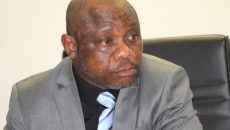GANTA, Nimba – Augustus J. Flomo, deputy minister for economic management at the Ministry of Finance and Development Planning, says the Coalition for Democratic Change government needs US$6 billion to achieve its Pro-Poor Agenda in the next five to six years.
Flomo made the disclosure on Monday, June 4 in Ganta at the start of a three-day national traditional leaders’ conference on the government’s development agenda.
The gathering is intended to seek support from traditional leaders to actively support Weah’s development agenda.
As deputy minister for economic management, Flomo said the conference provided him the opportunity to listen to the traditional leaders and elders.
“They provided some good insights that the government can consider as the Pro-Poor Agenda is being finalized,†he said, noting that they placed particular emphasis on agriculture.
He said the government hopes to complete the agenda by June 30.
According to Flomo, US$3.5 billion will be raise internally while US$2.5 billion is expected to come from external partners.
Job creation, health, infrastructure, sustaining the peace, reconciliation, governance and transparency, education, electricity, and the economy are all be captured in the Pro-Poor Agenda, Flomo said. He noted particularly that “there is no way the government can have an effective and functioning economy without electricity.â€
The deputy minister for economic management pointed out that if the government diversified the economy and kept it more functional, domestic revenue generation will be increase.
He noted that past economic shocks had limited the government’s revenue generating capability, including the Ebola outbreak, the drop in the price of the country two major commodities on the international market, the drawdown of UNMIL, coupled with the prolonged 2017 election cycle.
“The government is working to remove itself from the strangulation position and it is the process we are putting in the Pro-Poor Agenda,†he said.
He said he believes that the Pro-Poor Agenda can be achieved through collaboration among the government, civil society, traditional leaders, the private sector, and partners.
Featured photo by Zeze Ballah



